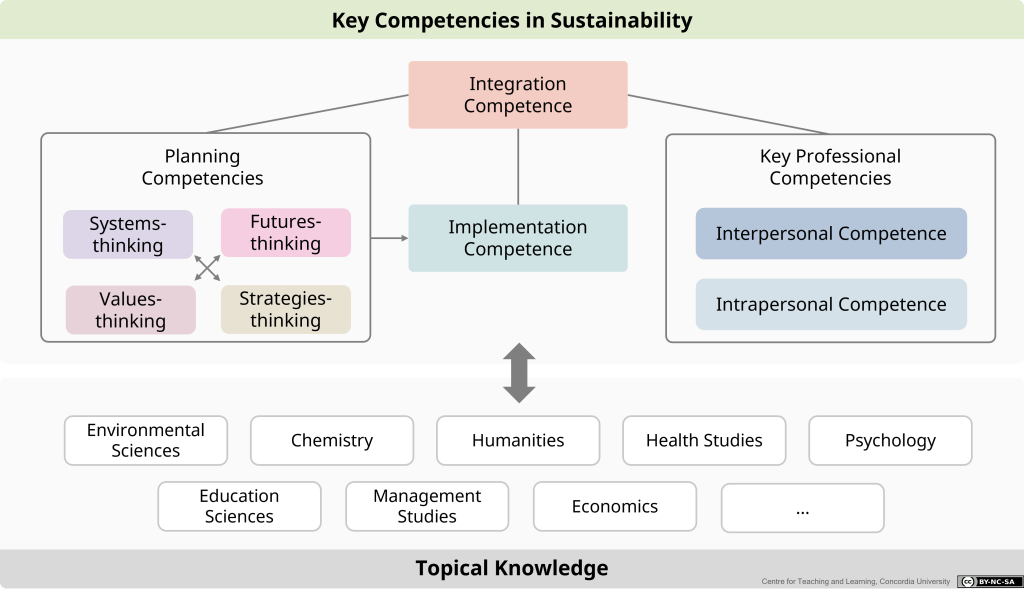A comprehensive framework of key competencies
“Advancing transformations towards sustainability calls for change agents equipped with a new set of competencies” (Redman & Wiek, 2021, p 1).
Several scholars have explored the key competencies necessary for sustainability, with Wiek et al. (2011) providing an initial framework that achieved broad recognition. Expanding on this foundation and following a systematic review of pertinent literature, Redman and Wiek (2021) formulated a unified framework of eight competencies for advancing sustainability transformations, applicable across disciplines and alongside disciplinary, general, and other professional competencies as shown in the following diagram. The definitions of the eight key competencies are listed below.

Text description of diagram key competencies in sustainability (docx)
An interplay of competencies
The key competencies framework is not meant merely to be a checklist, but rather a comprehensive integration of all essential competencies to advance education for sustainability. “Systems-thinking, futures-thinking, values-thinking, and strategies-thinking enable crafting sustainability action plans that yield sustainability outcomes if successfully implemented (which requires implementation competence). Inter- and intra-personal competencies (key professional competencies) enable that planning and implementation is undertaken in collaborative and self-caring ways—key factors for success. Finally, integration competence enables a coherent combination of collaborative and self-caring planning and implementation efforts, using established procedures for sustainability problem-solving” (Redman & Wiek, 2021, p. 5).
Definitions of sustainability competencies
In the following table, each key sustainability competency is described as per Aaron Redman and Arnim Wiek (2021, p. 6).
| Competency | Definition | Related verbs |
| Systems-thinking | Ability to apply modelling and complex analytical approaches to analyze complex systems and sustainability problems across different domains (environmental, social, economic) and across different scales (local to global), including cascading effects, inertia, feedback loops, and other system dynamics and to analyze the impacts of sustainability action plans (strategies) and interventions (how they change systems and problems). | Understand, identify, describe, and analyze sustainability challenges and problems, complex issues, effects, relationships, impacts, patterns, structures, unintended consequences, feedback loops, context, interactions, etc. across different domains (environmental, social, economic), scales (local to global), and perspectives (interdisciplinary), etc. |
| Futures-thinking | Ability to carry out or construct simulations, forecasts, scenarios, and visions to anticipate future states and dynamics of complex systems and sustainability problems, and to anticipate how sustainability action plans (strategies) might play out in the future (if implemented). | Anticipate, foresight, envision, craft, analyze, and evaluate long-term future consequences, scenarios (multiple futures), and visions regarding intergenerational equity, future generations, uncertainty, etc. |
| Values-thinking | Ability to identify, map, specify, negotiate, and apply sustainability values, principles, and goals to assess the sustainability of current or future states of complex systems, to construct sustainability visions for these systems, and to assess the sustainability of action plans (strategies) and interventions. | Identify, assess, negotiate, reconcile, reflect on, map, and apply sustainability principles, morals, norms, ethics, goals, integrity, justice, conflicts, tradeoffs, etc. |
| Strategies-thinking | Ability to construct and test viable strategies (action plans) for interventions, transitions, and transformations toward sustainability. | Design, create, develop, and test transformative, innovative, viable, feasible interventions, transitions, strategies, action plans, solutions, etc. considering barriers, inertia, path dependence, carriers, assets, etc. |
| Implementation | Ability to put sustainability strategies (action plans) into action, including implementation, adaptation, transfer and scaling, in effective and efficient ways. | Implement, enact, adapt, manage, transfer, and scale action plans, strategies, change plans, intervention plans, governance initiatives, etc. |
| Intrapersonal | Ability to avoid personal health challenges and burnout in advancing sustainability transformations through resilience-oriented self-care (awareness and self-regulation). | Reflect, motivate, have respect for, be responsible, be empathetic, and self-care for identity, commitment, feelings, burnout, personal boundaries, limits of capacity, etc. |
| Integration | Ability to apply collective problem-solving procedures to complex sustainability problems to develop viable sustainability strategies (action plans), and successfully implement them, in collaborative and self-caring ways. | Develop, apply, promote, and make decisions to advance sustainability by using viable, equitable, and inclusive solution processes, procedures, frameworks, schemes, etc. |
Different frameworks of sustainability competencies
Various authors (Brundiers et al., 2023; Giangrande et al., 2019; Redman & Wiek, 2021; UNESCO, 2017; ) have identified essential skills that students must acquire to confront sustainability challenges, each generating their inventory of abilities and proficiencies required to become catalysts for change. There is considerable overlap among these models, prompting the development of resources aimed at comprehending and contrasting them. Notably, efforts are underway (Global Council for Science and the Environment, Association for the Advancement of Sustainability in Higher Education) to explore the connections between the key competencies promoted by the Global Council for Science and the Environment (GCSE) and UN’s skill sets designed to advance the Sustainable Development Goals (SDGs).
To access more frameworks on sustainability competencies, please visit these links:
- GCSE Proposal Statement on Key Competencies in Sustainability
- Key competencies in sustainability: a reference framework for academic program development
- ASU’s 6 Key Competencies in Sustainability
- Learning to transform the world: key competencies in education for sustainable development
To dive into latest trends in education for sustainability, please access this chapter.

